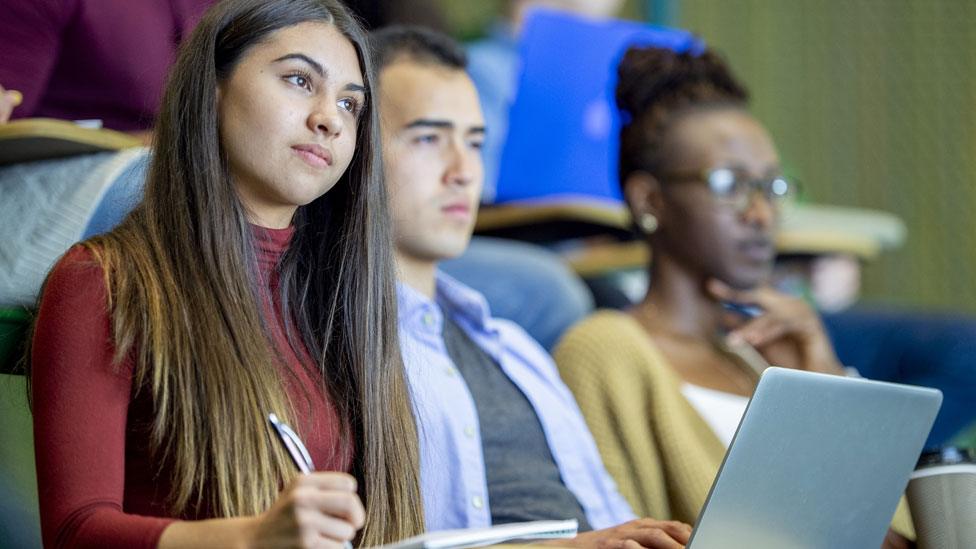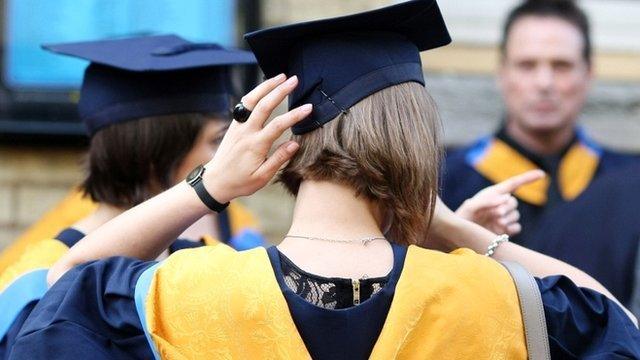Top universities to give more places to disadvantaged
- Published
- comments

Top universities in England have been told to significantly increase places for disadvantaged youngsters.
The university watchdog, the Office for Students, wants the "access gap" between wealthier and poorer students to be halved in five years.
Young people from affluent areas are six times more likely to get places at the most selective universities.
"It is damning for the sector that large gaps still remain," said Universities Minister Chris Skidmore.
"We cannot let this talent be wasted."
But private schools' leaders said universities should not "discriminate" against their pupils.
The Office for Students said despite an increase in the overall number of students, the proportion of disadvantaged students in most selective universities had "hardly changed".
It said the widest gaps, between numbers of the most and least advantaged, were at Imperial College London, Oxford, Cambridge, Bristol, the London School of Economics and University College London.
Oxford recruits 15 students from the most advantaged areas for every one student from the least advantaged - with a target of reducing the ratio to eight to one.
If targets are not reached in 2025, the Office for Students could in theory levy fines, although it has so far not used such powers.
The watchdog said its targets would mean another 6,500 disadvantaged students getting places in leading universities after five years, with the expectation many of these would come from the North of England, the Midlands and the South West.
But unless universities increase their overall numbers, this would mean a squeeze on places for middle-class pupils and those from London and the South East.
Mike Buchanan, executive director of the Headmasters' and Headmistresses' Conference group of independent schools, said young people should not be discriminated against because of the "class they were born into".

He said universities should be expanded to "take as many truly suitable students as necessary, rather than rob some students of a future to award it to others".
And "contextual" information about applicants - such as taking into account the schools they have attended and barriers they might have overcome - should not be used to make generalised assumptions about which pupils were advantaged and disadvantaged, which could be incorrect.
Mr Buchanan also called on universities not to increase international student numbers if it denied places to UK students.
The watchdog's director of fair access and participation, Chris Millward, said there could be "displacement" of some students, for instance at Oxford and Cambridge, which he thought had no plans to increase overall numbers.
"Inevitably in Oxbridge, if they don't grow, then the groups that are very highly represented in those universities will be less represented at the end of this. There's no doubt about that," he said.
But he said there was an underlying "fairness issue" - and that at present the most selective universities were not recruiting widely enough and were missing out on potential talent.
Across all types of university, the Office for Students warns of a "postcode lottery" of regional differences.
In London, 54% of young people go to university, while in the North East of England it is 39%.
"What is an assumed rite of passage for many young people across the country is often viewed very differently in rural and coastal communities, the industrial heartlands and military towns," said Sir Michael Barber, who chairs the Office for Students.
A spokeswoman for Universities UK said: "These new targets show an unprecedented level of ambition."
But reducing the "equality gap" would require long-term funding to "improve our understanding of what works".
- Published17 December 2019

- Published9 July 2019

- Published14 February 2019
